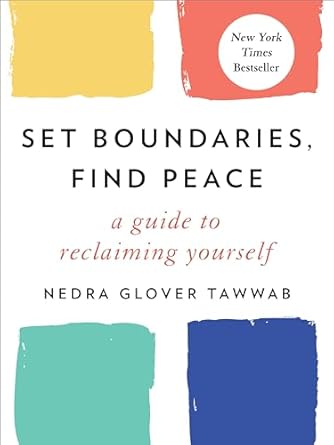Hello dear friends,
Pleased with the just concluded election result? Or you do not like getting involved with politics? Either way, we move and put our eyes on God. Try not to get yourself worked up at all. Just keep praying for God’s will to be done and do your part to make this world a safe place for everyone to exist in peace.
Get this Breathing Exercise App link
Female friendships are some of the most enriching and affirming connections we can cultivate. However, like any relationship, they thrive best when boundaries are in place. Imagine a relationship without boundaries and all the problems that can bring, destruction is inevitable.
The definition I like best is “Boundaries keep the bad out, and the good in”. Do you agree?
Earlier in my life, I wasn’t sure how to communicate my boundaries and I let people walk all over them, at great emotional expense. I knew what was happening but didn’t have the words to say I wasn’t ok with it or to say what I would prefer.
The internal distress it caused me led to a string of badly managed friendships and romantic relationships made spicy by an explosive temper. No, please don’t put yourself through that, learn the skill and save people you love and who love you the pain.
Boundaries not only protect our mental health but also foster a balanced, respectful dynamic that allows for true growth and support.
In this post, we’ll explore the role of boundaries in sisterhood and how they contribute to maintaining healthy, supportive friendships.


Why Boundaries Matter in Female Friendships
Boundaries often get a bad reputation as barriers between people, but they’re quite the opposite—they’re guidelines that help ensure respect, understanding, and space for individuality. They make us feel safe so we can thrive, be creative and explore deeper relationship goals.
Healthy boundaries in friendships:
- Encourage Mutual Respect
Boundaries help friends respect each other’s personal limits, reducing the likelihood of misunderstandings, overstepping, and feelings of resentment. When we communicate our boundaries clearly, we lay the foundation for a friendship based on mutual respect. - Promote Emotional Well-being
Having boundaries in place allows friends to protect their mental and emotional health, balancing the need for connection with self-care. This balance is essential in a world where stress, intensive personal commitments, and high productivity is applauded. - Encourage Independence and Growth
While friendship often involves shared experiences and time, boundaries encourage both parties to have individual space to pursue their interests, passions, and personal growth.
Do you remember a time when you did not communicate your boundaries or someone ignored them totally?
That feeling of self betrayal, guilt, shame, anger disrespect and the proverbial “na me be this?”
Types of Boundaries to Establish in Sisterhood
Friendship boundaries vary depending on individual needs and personalities, but here are some of the most common types that contribute to healthier friendships:
- Emotional Boundaries
These involve knowing and communicating your emotional limits, such as how much you’re able to listen and support each other during challenging times.
Healthy emotional boundaries prevent burnout, particularly in friendships where one person may rely heavily on the other for support. It is important to be there for one another, just make sure you are also getting some downtime and eartime too. - Time Boundaries
Time boundaries set limits on how much time you spend together and protect your time for other commitments. It’s okay to say no to frequent meet-ups or to let a friend know that certain times are off-limits due to personal obligations. A good example is “Sorry I can’t talk right now, kindly text me or I will call you later”. - Communication Boundaries
Communication boundaries establish how often and in what ways you stay in touch. For example, some friends may be comfortable with frequent texting, while others may prefer less frequent but more meaningful in-person conversations.
Understanding and respecting these preferences prevents Don’t be the person that violates another person’s boundaries just because they make you uncomfortable, respect your friends. - Privacy Boundaries
Privacy boundaries involve respecting each other’s comfort with sharing personal details. Some friends may be open books, while others prefer to keep certain matters private. Being mindful of what your friend is comfortable sharing and respecting that privacy is essential for trust. If there is something you are not sure about, ask them, don’t make any assumptions. - Boundary for Giving and Receiving Advice
Friends naturally want to help, but sometimes unsolicited advice or overly frequent input can create tension. It’s crucial to understand when your friend is seeking advice versus when they simply want a listening ear, allowing space for both. If you are not sure ask.
She just called you to complain about a situation, make the appropriate sounds and ask “so how can I help you with this situation, are we beating someone up or do you want a cuddle?”


Setting boundaries in a Respectful and Constructive way
Setting boundaries can feel intimidating, but open and honest communication is key to maintaining any strong friendship. Here are some tips to set boundaries in a respectful and constructive way:
- Understand Your Needs First
Reflect on what you need in the friendship to feel balanced, respected, and supported. This self-awareness will help you communicate clearly and prevent misunderstandings. It may sound serious but that’s the whole point, this friendship is important to you, act like it is, do the work. - Choose the Right Moment
Approach boundary-setting conversations at a time when both of you are calm, relaxed, and open to talking. Avoid discussing boundaries during conflicts, as heightened emotions can lead to defensive responses.
I choose a random day and just text “ hiya just checking in about tomorrow, you know how you struggle with getting to places on time, can you set an alarm and I’ll remind you and hour before I head out to yours, ok?” This text will save you another annoyance cycle. - Use “I” Statements
Frame your boundaries in terms of your needs rather than blaming or criticizing your friend. For example, say, “I need some quiet time after work to recharge” rather than, “You always want to hang out too often.” “ I prefer to order my food myself please, thank you for offering”. - Be Honest and Direct
Don’t be afraid to be clear and straightforward. Good friends will appreciate honesty, and setting boundaries is a natural part of any healthy relationship.
Remember, expressing your needs doesn’t make you a bad friend; it makes you a more authentic one. Now there is always that friend that doesn’t like hearing the truth, it’s up to you to decide if honesty is a core value for you or not. If it is, this cannot be your close friend, fini. - Reassure Your Friend of Their Importance
Let your friend know that these boundaries are not about creating distance or reducing the value of your friendship. Emphasize that by setting boundaries, you’re investing in the long-term health and happiness of the relationship. Most good friends don’t need this spiel, beware of people who always need you to explain your soul away.


Maintaining Boundaries Over Time
Setting boundaries is only part of the process—sticking to them and respecting each other’s boundaries is equally important. Here’s how to keep boundaries effective:
- Regular Check-ins
Friendship dynamics change over time, and so do boundaries. Check in with each other periodically to see if any adjustments are needed or if new boundaries should be established as your friendship grows.
I remember one time when I decided to go to bed early and switch off my phone, it wasn’t easy because I would often wake up to lots of missed calls and texts that we’re non urgent but would have needed a response if I was awake. My friends understood this and eventually stopped trying to reach me at that time, we now joke about it. - Respect Each Other’s Boundaries
While it’s crucial to communicate your needs, it’s just as important to honor your friend’s boundaries. Mutual respect is the foundation of a strong friendship, and respecting each other’s limits nurtures this respect. Your friends do life with you and see you evolve over time, respect them. - Be Flexible, but Don’t Compromise Your Core Needs
Flexibility is a beautiful part of friendship, but don’t let it compromise your well-being. If a boundary you’ve set starts feeling compromised, take time to address it rather than letting resentment build up, and then you might go “pop”! - Seek Understanding During Conflicts
Boundaries aren’t foolproof, and misunderstandings can still arise. If a conflict arises around a boundary, aim for understanding rather than blame. Discuss what went wrong, clarify needs, and find ways to prevent similar issues in the future.
Far from being restrictive, boundaries provide a framework for relationships to flourish. In sisterhood, they create space for growth, individual needs, and emotional safety, allowing friendships to become long-lasting sources of joy and support. Here’s how healthy boundaries ultimately strengthen female friendships:
- Trust and Respect
Setting boundaries fosters trust and shows mutual respect for each person’s needs and limits. When both friends know they can be honest and supportive without fear of overstepping, trust grows deeper. - Balanced, Reciprocated Support
Friendships flourish when support is mutual. Boundaries prevent one-sided dynamics, where one friend might feel overwhelmed or neglected. In a balanced friendship, both friends feel empowered to lean on each other without feeling drained. - Reduced Resentment and Increased Harmony
When friends respect each other’s boundaries, there’s less chance of unspoken resentment or misunderstandings. Boundaries create harmony, allowing both parties to enjoy the friendship without underlying tension.


Boundaries as a Form of Self-Love
Boundaries are one of the most essential components of a healthy, sustainable friendship. They encourage self-respect, mutual respect, and personal growth, fostering a balanced dynamic that allows both individuals to thrive.
Embracing boundaries is an act of self-love, empowering us to show up authentically for our friends and build a strong foundation of sisterhood that stands the test of time.
So, let’s celebrate the role of boundaries in sisterhood. By setting clear and compassionate boundaries, we create space for positive growth and beautiful life experiences. Give yourself that gift.
Until next time, stay authentic,
Stay resilient, and continue to honour your needs.
Live wholeheartedly,
Amaka
2 Cor 3:2(MSG)
You yourselves are all the endorsement we need. Your very lives are a letter that anyone can read by just looking at you. Christ himself wrote it—not with ink, but with God’s living Spirit; not chiseled into stone, but carved into human lives—and we publish it.

